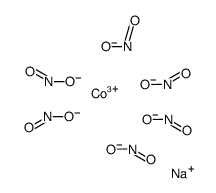14649-73-1
| Name | Sodium Cobaltinitrite |
|---|---|
| Synonyms |
Sodium hexanitritocobaltate(III)
trisodium,cobalt(3+),hexanitrite MFCD00003512 |
| Melting Point | 220ºC (dec.)(lit.) |
|---|---|
| Molecular Formula | CoN6Na3O12 |
| Molecular Weight | 403.93600 |
| Exact Mass | 403.86000 |
| PSA | 314.94000 |
| LogP | 1.50360 |
|
Section 1: Product Identification Chemical Name:Sodium hexanitritocobaltate (III), (ACS) CAS Registry Number:14649-73-1 Formula:Na3Co(NO2)6 EINECS Number:none Chemical Family:inorganic compound Synonym:Sodium cobaltinitrate
Section 2: Composition and Information on Ingredients IngredientCAS NumberPercentACGIH (TWA)OSHA (PEL) Title Compound14649-73-1100%0.02mg/m3 (as Co)no data Section 3: Hazards Identification Harmful if swallowed. May cause cancer by inhalation. May cause slight to mild irritation of eyes, skin, and Emergency Overview: respiratory tract. May cause sensitization by inhalation and skin contact. Primary Routes of Exposure:Inhalation, skin, eyes. Eye Contact:May cause irritation, redness and pain. May cause irritation to the skin. Symptoms include redness, itching and pain. May cause sensitization through Skin Contact: skin contact. May cause irritation to the respiratory tract. Symptoms may include coughing, shortness of breath, respiratory Inhalation: hyper sensitivity and asthma. Causes abdominal pain, nausea, vomiting, flushing of the face and ears, mild hypotension, rash, and ringing in Ingestion: the ears. Harmful if swallowed. May cause cancer by inhalation. May cause irritation of the eyes, skin and respiratory Acute Health Affects: tract. May cause sensitization by inhalation and skin contact. Repeated oral administration of cobalt salts may reduce thyroid activity, cause blood disease, and damage Chronic Health Affects:kidney, heart and lungs. Prolonged or repeated skin exposure may cause dermatitis. May cause cancer by inhalation. NTP:No IARC:Yes OSHA:No SECTION 4: First Aid Measures Immediately flush the eyes with copious amounts of water for at least 10-15 minutes. A victim may need Eye Exposure: assistance in keeping their eye lids open. Get immediate medical attention. Wash the affected area with water. Remove contaminated clothes if necessary. Seek medical assistance if Skin Exposure: irritation persists. Remove the victim to fresh air. Closely monitor the victim for signs of respiratory problems, such as difficulty Inhalation: in breathing, coughing, wheezing, or pain. In such cases seek immediate medical assistance. Seek medical attention immediately. Keep the victim calm. Give the victim water (only if conscious). Induce Ingestion: vomiting only if directed by medical personnel. SECTION 5: Fire Fighting Measures Flash Point:not applicable Autoignition Temperature:none Explosion Limits:none Extinguishing Medium:none required If involved in a fire, fire fighters should be equipped with a NIOSH approved positive pressure self-contained Special Fire Fighting Procedures: breathing apparatus and full protective clothing. Hazardous Combustion andNone Decomposion Products: Unusual Fire or Explosion Hazards: No unusual fire or explosion hazards. SECTION 6: Accidental Release Measures Spill and Leak Procedures:Small spills can be mixed with powdered sodium carbonate or ground limestone and swept up. SECTION 7: Handling and Storage Handling and Storage:Store material in a tightly sealed bottle away from moisture. SECTION 8: Exposure Controls and Personal Protection Eye Protection:Always wear approved safety glasses when handling a chemical substance in the laboratory. Skin Protection:Wear appropriate chemical resistant gloves and protective clothing. Ventilation:If possible, handle the material in an efficient fume hood. In the absence of adequate ventilation a respirator should be worn. The use of a respiratory requires a Respirator: Respirator Protection Program to be in compliance with 29 CFR 1910.134. Ventilation:If possible, handle the material in an efficient fume hood. Additional Protection:No additional protection required. SECTION 9: Physical and Chemical Properties Color and Form:orange pwdr. Molecular Weight:403.98 Melting Point:no data Boiling Point:no data Vapor Pressure:no data Specific Gravity:no data Odor:none Solubility in Water:soluble SECTION 10: Stability and Reactivity Stability:air and moisture stable Hazardous Polymerization:no hazardous polymerization Conditions to Avoid:Contact with reducing agents Incompatibility:Organic matter, reducing agents, active metals and halogens Decomposition Products:oxides of nitrogen SECTION 11: Toxicological Information RTECS Data:No information available in the RTECS files. Carcinogenic Effects:Carcinogen Mutagenic Effects:none Tetratogenic Effects:none SECTION 12: Ecological Information Avoid release to the environment. Very toxic to aquatic organisms. May cause long-term adverse effects in the Ecological Information: aquatic environment. SECTION 13: Disposal Considerations This material and its container must be disposed of as hazardous waste according to local, state and federal Disposal: regulations. SECTION 14: Transportation Shipping Name (CFR):Non-hazardous Hazard Class (CFR):NA Additional Hazard Class (CFR):NA Packaging Group (CFR):NA UN ID Number (CFR):NA Shipping Name (IATA):Non-hazardous Hazard Class (IATA):NA Additional Hazard Class (IATA):NA Packaging Group (IATA):NA UN ID Number (IATA):NA SECTION 15: Regulatory Information TSCA:Listed in the TSCA inventory. SARA (Title 313):Title compound: see category code N096 for reporting. Second Ingredient:none SECTION 16 - ADDITIONAL INFORMATION N/A |
| Hazard Codes | O: Oxidizing agent;Xn: Harmful; |
|---|---|
| Risk Phrases | 8-36/37/38-42/43 |
| Safety Phrases | 17-26-36/37 |
| RIDADR | UN 1479 5.1/PG 2 |
| Hazard Class | 5.0 |


